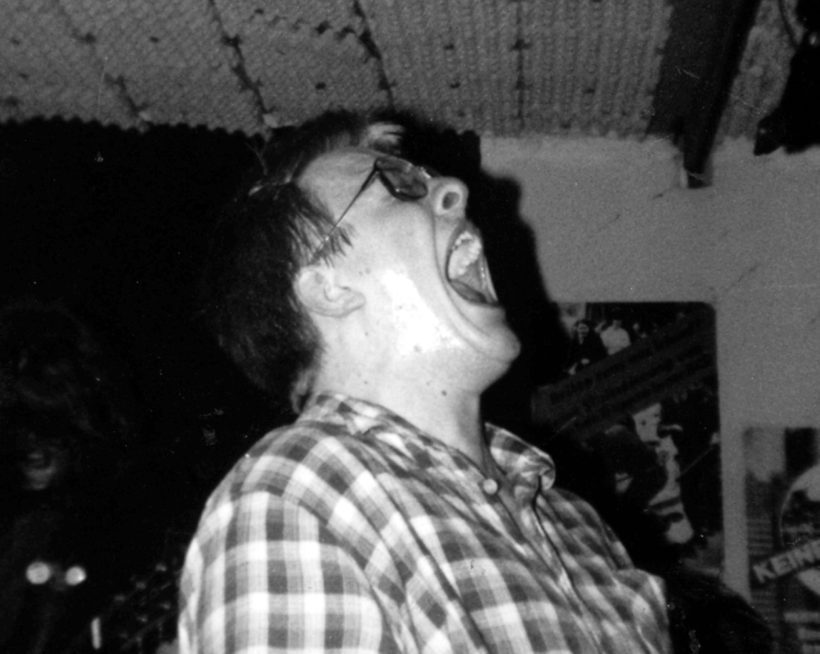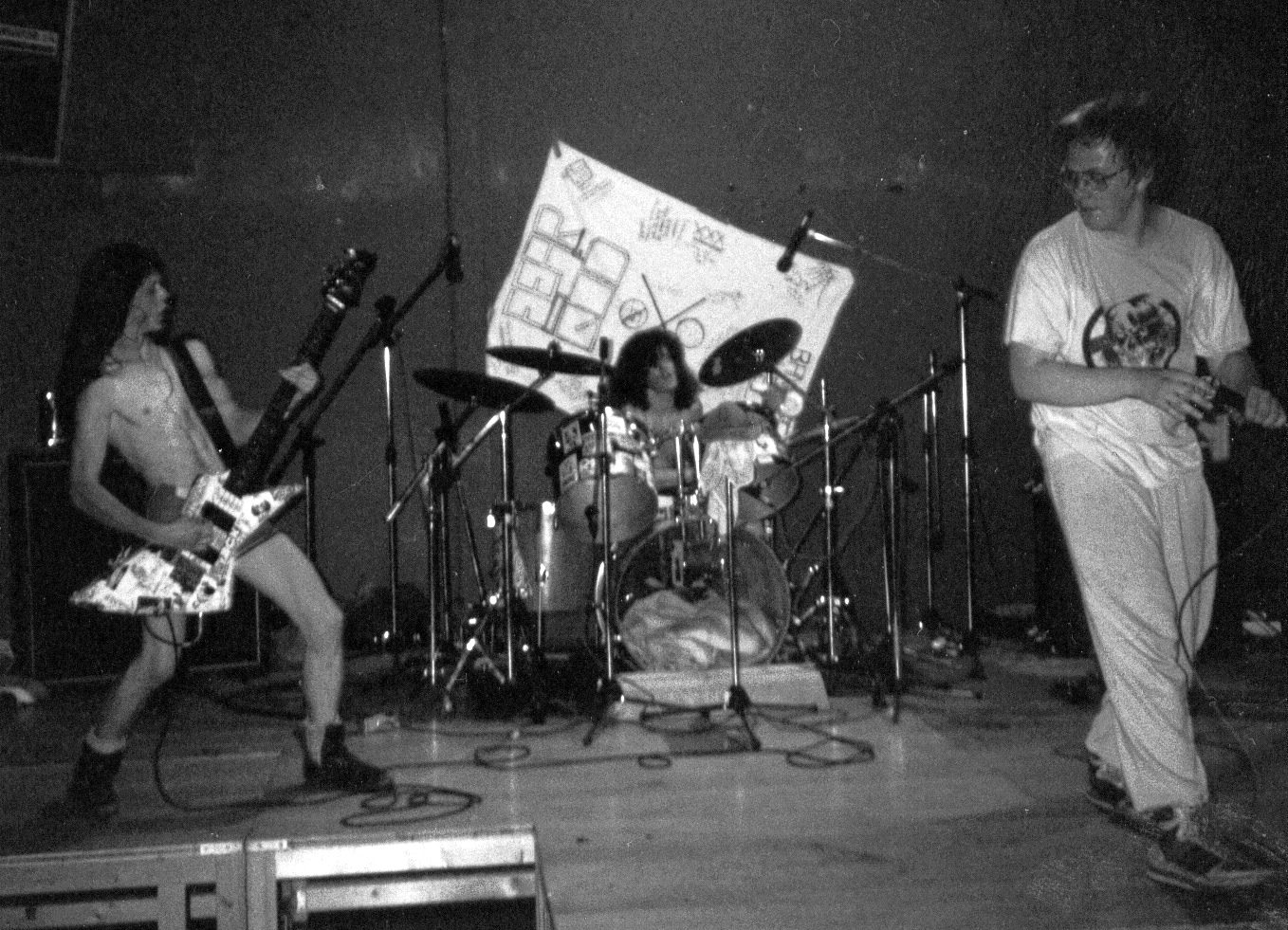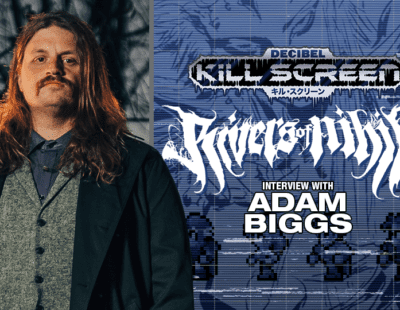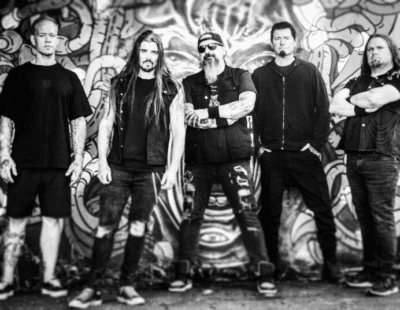
Swiss grind titans are set to re-release their self-titled EP on FOAD Records to celebrate the album’s 30th anniversary. For those unfamiliar, Fear of God are known primarily for being the first band to pioneer the combination of grindcore and harsh noise, which eventually evolved into the small yet influential micro-genre known as “noisegrind.” We sat down with frontman Erich Keller to discuss the process behind making the seminal album and the legacy of Fear of God:
In 1988 grindcore was still in its earliest stages. What was it that brought this style of music to your attention and more importantly what motivated your band’s idea to make grindcore music even harsher by adding noise elements and feedback?
Keller: Everybody in Fear of God, especially the bassist Tschösi & I had been active in the music underground for some time before we started the band. All of us were metal heads originally. I first got into music in the late 1970s and it was the emerging NWOBHM that really fired things up for anybody. That’s where the whole conquest of extreme, if you want, started for us. It was a race, a competition: who knows the most unknown band, who has the most extreme recordings, the fastest, the wildest. That’s how Tschösi and I got into the tape trading circuit early, which eventually expanded our horizon immensely. We got in touch with all kind of new sounds, also hardcore and punk. Tschösi, who was the founder of Messiah, a pioneering death metal band and I had talked a lot about forming a band one day that would try and be the most brutal band. Things just evolved from there.
What was the extreme metal scene like in Switzerland at that time? How would you describe it?
Keller: There was no such thing as a consistent scene. Hellhammer and Celtic Frost were exceptional on all levels. I had followed them since their early days but around 1985, when To Mega Therion came out, I felt disappointed by the direction they had taken. Too operatic, too Wagnerian, too much fantasy. So the only other swiss band I could really relate to was Messiah which was also the reason for me to promote a show with them opening for Celtic Frost in winter of 1985. This was a culmination point. More bands started to pop up, some of them had been fiddling around before but never made waves. Excruciation, Exxor, Tenebre and other bands gained a bit of momentum and at the same time, the hardcore and crossover thing brought fresh blood. 1985 to 1987 were something like a short spring time for a new breed of metal and hardcore in Switzerland, even though on a very small level, compared to what was going on around the world.

You claim that the band’s intent when recording the first album was to “destroy music.” What exactly did you mean by this notion and would you say you were successful in any way?
Keller: Our goal was plain and simple: we wanted to push things to their limit. Soundwise. We had this vision of pure sound. Image, lyrics, a certain stage presence that consisted of posing and pleasing the audience – what we wanted was to step by step leave all that behind us. When we played bigger shows, for instance, we would always demand that they would turn off all lighting effects on the stage and just crank up the volume to 11.5. Bass, drums, guitar and vocals: these were our tools. We wanted to use them in the most savage way. Were we successful? There was this one show in Hanau, Western Germany (its recording is on the B-side of our live album As Statues Fell). We managed to completely annihilate the place, it was a sonic frenzy. When the country’s leading hardcore fanzine a few weeks later made a poll for the “biggest desasters of 1988,” after some chemical and nuclear incidents that shook Germany, the readers voted Fear of God live in Hanau as the biggest catastrophe of the year. I think that was just what we aspired to achieve.
Much of the cacophony and feedback on the album stems from the way the vocals were recorded. What effects did you use to achieve this?
Keller: It was just the studio’s shitty equipment. There are no effects on the voice, it’s just distortion from really screaming my lungs out.
You have stated that you were at first very disappointed in the way the album turned out and that it took you many years to learn to enjoy it. How did your perspective and attitude change to allow you to accept the album for what it is?
Keller: Part of it was the way people talked about it. Over the years I met quite some people who told me about the effect the EP had to them. It just started to sink, how people told me what they heard. Well, when I heard imperfection, they heard something quite unique. I seem to remember how most of them would use certain metaphors, like that it sounds cold or inhumane to them. Wasn’t that what we wanted with the band? So in the end I learned to enjoy it for what it is. Personally, I wanted something else, like a more manic, more over the top Napalm Death Scum’s A-side. But it is what it is. When I got people over at my house, like you know, more regular guys, academics or people with a more conventional taste in music and they ask me to play that old band of mine they heard of and I put Fear of God on – it’s still the same. “Is that really you?!”, they would go. And I’m happy. It still works.
The band was only together from 1986 – 1988. Although its existence was brief, Fear of God were radical for their time and had a strong influence on the then burgeoning grindcore movement. What would you say the legacy of your band is and are there any bands today that currently embody the spirit you guys had back in 1987?
Keller: I think our legacy is slowly fading out. We weren’t a very active, productive band and maybe our sound was much more entangled in a specific point in time. One that is really gone and that does not seem to be so appealing to the retromania that has strangled and murdered all musical creativity. It’s a nightmare, really. Rock music has ceased to be a source of inspiration and innovation. Instead it has become a Potemkin village. It’s puzzling, especially for a historian, to see how music and protest have grown apart in the age of neoliberalism. From rock ’n’ roll, to beat, to rock and punk, metal, hip hop, grunge or techno – music was a sign of certain times, social, political and cultural change. And now? Music is just a backdrop. Its imagery, its ideas, force that came with the music and all that – it has become nothing but a huge, sad reservoir of outdated, meaningless and pretty idiotic style that people consume. That’s all. It’s about time young people step out of the shadow of the past and start thinking about their future, their creativity, the dreams and hopes of their generation. They certainly won’t need the music of the late 20th century for that.







